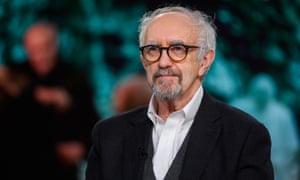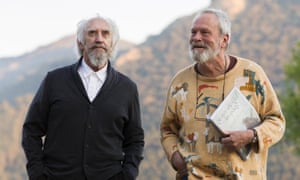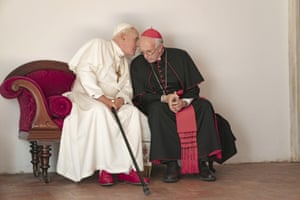Jonathan Pryce: ‘There’s a definite shortage of 72-year-old Welsh men’
The actor talks about his Oscar nomination for The Two Popes and his new role as Don Quixote, before moving on to the vexed subject of inequality in the movie industry
It is the day after the Oscar nominations, and Jonathan Pryce is perched at a corner table in a humdrum London bar, guest of honour at the saddest celebration in town. His first best-actor nomination has been a long time coming. At the age of 72, he has arrived. “Best newcomer,” he says ruefully. “Although I already do have a best newcomer award. It was for Breaking Glass. Back in 1980.”
It is no surprise to see Pryce honoured for his lovely performance in The Two Popes, a likable Netflix drama that spotlights the bromance between Benedict and Francis, but it knocked him sideways all the same. He had not thought he stood a chance; he had just come out of the shower when the news came through. Since then, his phone has barely stopped buzzing. Congratulations and requests. Demands on his time. “But it’s great,” he adds quickly, and almost sounds as if he means it.
Whether by accident or design, Pryce has spent much of his career as the quiet man of British acting; the coiled spring in the works, unobtrusive, precise and usually critical, whether he is playing a Bond villain on screen orShylock on stage; Cardinal Wolsey in Wolf Hall or the High Sparrow in Game of Thrones. Like Pope Francis, perhaps, he is the connoisseur’s choice, the progressive dark horse. Still, you should never make the mistake of confusing an actor with the characters they play.
His latest appearance, in Terry Gilliam’s The Man Who Killed Don Quixote, brings him full circle. It was Gilliam who provided Pryce with his breakthrough role in 1985’s Brazil, and the two have remained firm friends ever since. The film itself is a rackety, rambunctious affair. Adam Driver headlines as a jaded commercials director at large in rural Spain. Pryce co-stars as Javier, a deluded old shoemaker who fancies himself as Quixote. He comes clip-clopping through the desert in tin-pan armour, his peevish stare fixed on the far horizon.
The way Pryce tells it, he was essentially playing two men at the same time. “And that’s the get-out-of-jail card. Because if I’m not very good as Don Quixote, you can blame it on the shoemaker, who’s not a very good actor. But also Quixote’s playing a role himself, the noble knight. So it’s all role play and the masks are always slipping.”
Pryce was offered a slot in Gilliam’s first, ill-fated, stab at the film in 2000, but turned it down because he thought the script was weak. Since then, the role of Quixote has bounced from Jean Rochefort to John Hurt to Michael Palin before landing in Pryce’s lap. Gilliam now suspects this was preordained. “Jonathan has basically been waiting to play this part ever since our first collapse,” he says.
The director has said some other things, too. Earlier this month, Gilliam told the journalist Alexandra Pollard that #MeToo was a witch-hunt. He said that women in Hollywood should take more responsibility for themselves and that he was “tired of white men being blamed for everything”. But that’s Terry, Pryce says. “He’s always been a provocateur. That’s what he thrives on: being outrageous, going to extremes.” Besides, he adds, the whole #MeToo issue remains so fresh and raw; people are still working out how to discuss it. “That’s not to say he was misunderstood or misconstrued,” he adds. “I think it was very clear what he was saying.”
Until now, I have filed Gilliam and Pryce as odd-couple collaborators: the disreputable old goat and his cerebral, soft-spoken alter ego. Pryce nods. “The straight man and the clown. Except that, in this case, the clown is playing the role of straight man. Meanwhile, I’m stuck on the horse, playing the clown.”
In contrast to Gilliam, Pryce would rather stay out of the limelight; steer clear of trouble. By and large, he has been successful. But in 1991, he sparked fury in the US with his portrayal of a Eurasian pimp called the Engineer in the Broadway production of Miss Saigon. Equity labelled the role “an affront to the Asian community” and demanded he withdraw. The ensuing standoff almost derailed the production.
I ask whether, three decades on, he has more sympathy for Equity’s objection. He says that, on the contrary, he had sympathy for it then. The experience was horrific. He felt like the lightning rod for a wider cultural storm. “I mean, I was always confident that I wasn’t portraying a stereotype,” he insists. “But all I could do was sit back and let other people have the argument. And I got support from very strange and unwanted quarters. Charlton Heston sent me a photo of him playing Fu Manchu. He signed it: ‘From one yellowface to another.’ And I thought: ‘That’s not what I’m doing, Charlton. Thanks for your support.’”
The point is that Pryce had always been at pains to work with multi-ethnic casts. In Stratford, on Broadway, wherever it was. “So you’re thinking: ‘What the hell is this? I’m the nice guy here.’ But that’s the way change happens. It showed there was an inequality in the casting process. It’s just tough when you’re on the receiving end.”
It infuriated him then. It still rankles today. “You know, I was in New York recently, at an influencer, as I think they call them. Academy members watch your film. You meet them. Schmooze-fest. And this Asian lady grabbed my arm and was shouting: ‘I protest you! I protest you!’ Talking about what she’d done 30 years ago. ‘I stuck paper down your toilet in the theatre!’ Because we had protesters who used to come to the show to disrupt it.”
Pryce appears to be giving the protester a comedy accent. I hope this wasn’t the voice he used for his Eurasian pimp. Anyway, he continues, the upshot was that, at the end of this rant, she still wanted to have her picture taken with him. “And then, in the photo, she’s pointing like this in my face. Saying: ‘I protest him!’”
We are still sitting in the corner of our becalmed London bar. By this point, Pryce has turned a little wild-eyed. A woman sidles over and apologises for interrupting, but says she simply had to say hello. She says she is from his home town of Holywell in north Wales and adds: “Did you know there’s a big picture of you up in the local pub?”
Pryce shakes his head distractedly. “You should go back and see it,” she says.
It is funny, he confides, people tend to think he is Jewish. Even Mel Brooks, of all people, assumed that he was. In fact, he is a Celt, raised Presbyterian, the son of a miner who later ran a grocer’s shop. “But I left home when I was 18,” he shrugs. “I’ve got fond memories of home and I’ve got negative memories of home. I don’t really get back there as much as I should.”
Some years back, he returned to Holywell for a school reunion. It was nice; he met classmates he hadn’t seen in decades. “But I was thinking: ‘Oh my God, they all look really old. Thank God I don’t look like that.’ Then we did a group picture. And then they sent it to me.” He dissolves with laughter. “And in among all those old people was just another old person.”
Our conversation has been a little choppy. All the same, I am pleased Pryce is finally being honoured by the Academy. By rights, he should have been nominated for Brazil, for Carrington or for his role as Glenn Close’s preening novelist husband in The Wife. I ask which of his roles he feels was unfairly overlooked, and he chuckles and says it is not a question he can answer. “It reminds me of the argument we’re having now about women who should have been nominated, or ethnic minorities who should have been nominated, when people forget that it’s a competition, it’s a ‘Who’s best?’ I mean, when I vote or when I look at a film, I don’t think: ‘Oh, it’s a woman director, therefore I’ll watch it in a different way.’ I’ll watch it as a film and judge it as that.”
Hang on, I tell him, it is not as simple as that. He is assuming there exists an objective standard of excellence. The truth surely, is that our ideas of what is good and what is bad are conditioned by a whole bunch of factors: gender, ethnicity, class, what have you. If people are angered by this year’s Oscars, it is because they feel the Academy is not representative of cinema as a whole. If you broadened the voter base, you would get a richer spread of nominees.
The actor winces. “Well, you can have that argument,” he says. “But it is rather patronising, the idea that if you get more African-Caribbean voters they’ll only vote for African-Caribbean films. And I’d only vote for Welsh films. Sometimes I can’t believe that we’re still having that argument. It’s only a fucking prize.”
He reaches for his water; he is practically spluttering. Yes, of course, he admits, people are herd-like and tribal. You can see it in politics, in society and in the film industry, too. People view the world – or the Oscar nominations – from their own particular vantage point. He gulps his drink and attempts a joke. He says: “I think there’s a definite shortage of 72-year-old Welsh men.”
The Man Who Killed Don Quixote is released on 31 January. Terry Gilliam and Jonathan Pryce will be taking part in a Q&A streamed nationwide after previews on 23 January




No hay comentarios:
Publicar un comentario